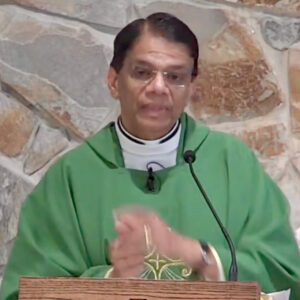Now the vocation of Israel was indeed to be a holy people, who were to be a light to the nations. This is our call as well, because we, too, are God’s disciples who are called to be holy. He speaks to us, knowing the real poverty of our attempts to follow Him. He speaks always from the richness of His love and mercy for each of us. Of course, His call for each of us is to repentance and conversion.
The call to holiness, that is, to be God’s light to the world, is our vocation. What “comes out” of each one of us is important. This is how His kingdom grows in us and among us.
Mark tells us that these Pharisees and scribes had come from Jerusalem. The mention of Jerusalem is a reminder that Jesus will die on a cross outside the walls of that city and that we will see the “Holy One of God.” Before he fed the 5,000, Mark tells us that Jesus felt a deep-seated compassion for the crowds, because they were like “sheep without a shepherd.” It is this same compassion which sent him to the cross. By the victory he won for us then, he has opened up the possibility that in his hands, once nailed to the cross, we might become the place where others encounter goodness, honesty, humility, justice, mercy, faith, hope, and love, and where our actions might offer genuine witness to the height and the depth, the width and the breadth of his undying love.
We have to consider two ways by which we can go beyond the rituals in order to enjoy more the blessings of God:
- Approach the rituals with purity of heart: For instance, the ritual of the washing of hands is meaningless when undertaken with impure or unrepentant heart. Hence, in the gospel reading, Jesus stressed the need for purity of heart: “Listen to me, all of you, and understand: there is nothing outside a person that by going in can defile, but the things that come out are what defile.” St. James would later emphasize this point: true religion entails keeping oneself unstained from the world. Let us sincerely repent before we approach any Christian ritual.
- Be compassionate towards others: The God whom we must approach with purity of heart and whose mysteries we must be conscious of is not visible to our eyes. Hence, a concrete way of expressing the fact that we are going beyond the rituals is to love others as He has loved us in His Son Jesus Christ. Such compassionate love should be given especially to the poor. St. James states that true religion entails the care of widows and orphans in their need.
My dear brothers and sisters in Jesus Christ, this means that our worship in the church has more meaning when it is accompanied by works of charity outside of it: showing love and mercy towards others as Jesus did to the poor and the needy, sick and unwanted. He did not look at the rituals, but above all, he looked at the heart of God’s love. So, by putting this into practice we shall be “Holy” or fulfill the call to be holy always.
Love and prayers,
Fr. Charley
